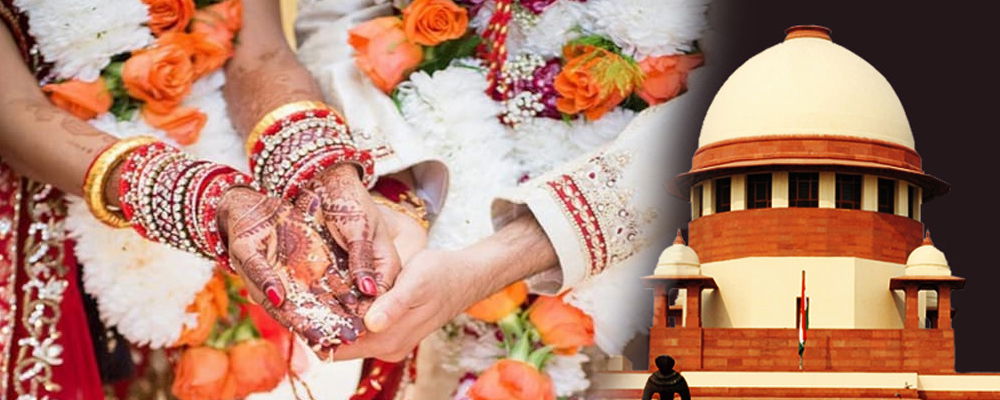Supreme Court Case Section 14 Hindu Marriage Acts Can File Within One Year
In India, nearly everyone believes that marriage is necessary. Marriage is a significant life event that ushers someone into adulthood. In general, rather than being the result of one person's resolve, this movement, like everything else in India, is the result of the efforts of many people. A partner is chosen for you without your consent, just as you are born into a particular family without having any choice in the issue.
India is divided between the north and the south in terms of the patterns of Hindu kinship and marriage. Other traditions are also practiced by various ethnic and tribal groups in the central, mountainous north, and eastern regions. Hindus are given instructions on how to create a structured marriage relationship with the Hindu Marriage Act. It gives marriage purpose, allows the bride and groom to live together, and gives their family and children a sense of stability so they can live without worrying about their parents. There are mainly two types of marriages, which are prevalent are love marriage and arranged marriage. In love marriages also there are chances that the couples seek divorce within 1 year of marriage. If the couple lives in Delhi then they can do court marriage in Delhi. After completing the court marriage process Delhi and after obtaining marriage certificate Delhi, they can seek divorce within one year of their marriage in case of exceptional circumstances.
Section 14 states that a divorce petition cannot be filed within the first year of marriage. Therefore, it is possible to think of a year as the time provided by the law for resolving, classifying, comprehending, and communicating problems with one another. Because of this, no court may hear a divorce petition before the one-year mark has passed. The Court may permit the petition to be presented after receiving an application in accordance with the norms of the High Court in the event of exceptional hardship to the petitioner or great depravity on the part of the respondent. The aim behind such a law is to give time to couples to understand each other. It gives them time to adjust to each other and not to take any decision in haste.
Fair Trial Rule: The fair trial rule states that if there is an appropriate but an imperfect level of compliance, a law's directory provisions—those that are not required—can be said to have been followed. Despite the non-obstante phrase at the beginning of Section 14 (1) of the HMA, the provision of that subsection's first sentence makes this provision of the HMA a law. A law provision is "directory" in nature rather than "mandatory," and if that is the case, as was already said, what must be observed is sufficient and/or ample compliance.
Case Laws:
In case of Smt Priyanka maity vs. shri sabyasachi maity, the Court held that According to a cursory reading of section 14 of the HMA, 1996, it appears that the legislature intentionally granted each spouse the ability to file for divorce before the year mark if it can be proven that there are exceptional hardships for the petitioner or exceptional depravity on the other party.
In Sankalp Singh v. Prarthana Chandra [2013 SCC OnLine Del 855] Court held that the courts may permit a petition to be filed prior to the marriage's first anniversary in specific instances of extreme hardship or depravity on the side of the Respondent. The parties must, however, demonstrate that their understanding was arrived at voluntarily and without coercion, suggestion, or undue influence. Furthermore, it is essential to demonstrate that there are no prospects for a peaceful resolution and that each party is aware of the consequences of their choice.
In Rishu Aggarwal vs Mohit Goyal MAT. APP. (F.C.) 110/2021 n CM APPL. 41458/20, Court held that the refusal of cohabitation inside a marriage cannot be justified as "exceptional difficulty" or "exceptional depravity," and a one-year requirement cannot be waived without extraordinary cause. The Court further stated that the refusal of a marital partnership or non-consummation because of behavioral or temperamental differences can only be grounds for divorce under cruelty.
The Hindu Marriage Act of 1955 has a number of divorce-related provisions. Consequently, the divorce is dissolution of marriage, according to the Hindu Marriage Act. Hindu women might get divorced for a variety of reasons, such as adultery, abandonment, Leprosy, brutality, conversion, and other issues. The Section of the Criminal Procedure Code Hindu married women are permitted to ask for maintenance under Section 125. Consequently, an innocent spouse has the right to file for divorce in court.
Visit us: - https://www.leadindia.law
Call Us: - +91-8800788535
Email: care@leadindia.law
YouTube: - https://www.youtube.com/c/LeadIndiaLawAssociates
Facebook: - https://www.facebook.com/leadindialaw
LinkedIn: - https://www.linkedin.com/company/76353439
Twitter: - https://twitter.com/leadindialaw
Pinterest: - https://in.pinterest.com/lawleadindia
Instagram: -https://www.instagram.com/leadindialawofficial
court marriage in delhi, marriage certificate delhi, court marriage process delhi

